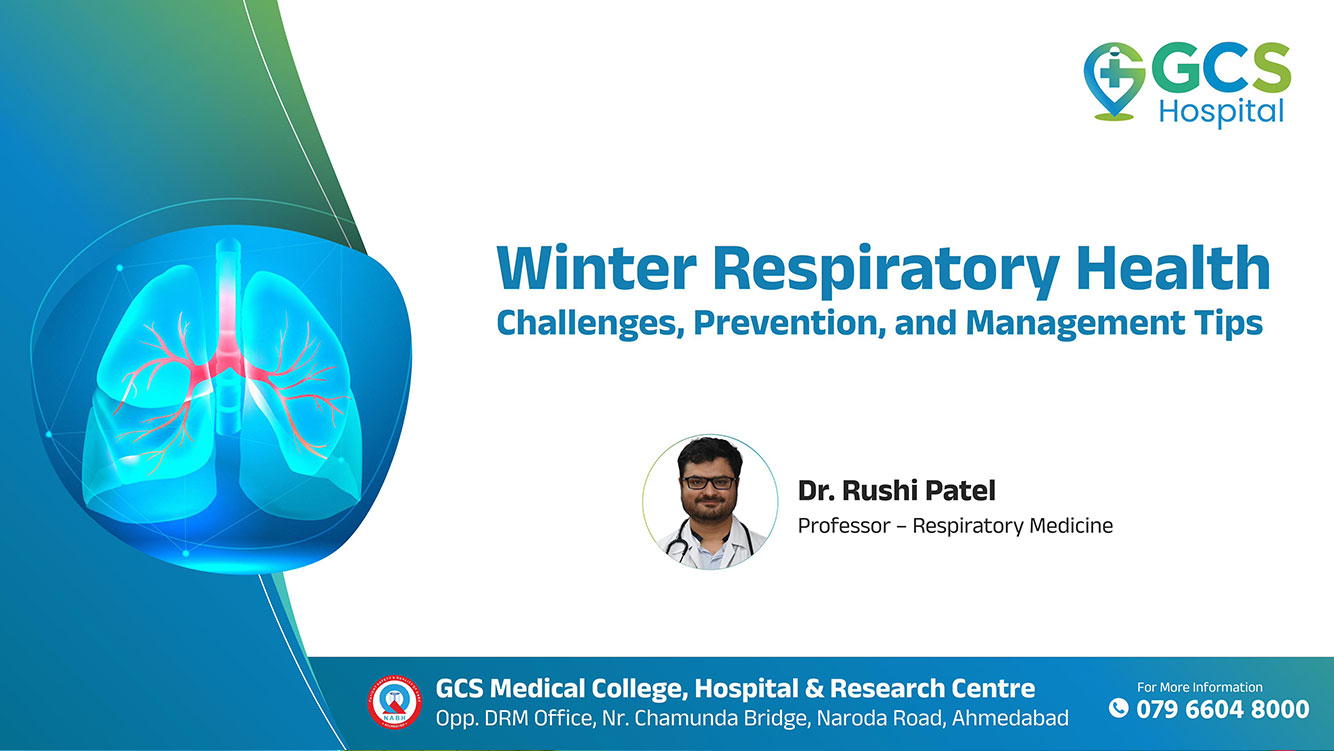
Winter Respiratory Health: Challenges, Prevention, and Management Tips at GCS Hospital
By Dr Rushi Patel – Professor – Respiratory Medicine20 January 2025
As winter rolls in with its crisp chill, our respiratory health faces a range of challenges. The cold, dry air, combined with indoor heating, can affect our lungs, making them more prone to infections and discomfort. At GCS Hospital, we understand the importance of maintaining optimal lung health during these months and want to help you navigate the winter season with effective prevention and management tips.
Challenges Faced Due to Winter Weather
Cold and Dry Air
Indoor Heating
Increased Risk of Infections
The cold and dry winter air can irritate your respiratory tract, leading to inflammation and discomfort. It can also dry out the protective mucus layer in your airways, leaving you more vulnerable to infections. Breathing in dry air can worsen symptoms for individuals already dealing with respiratory conditions like asthma or bronchitis.
While indoor heating makes winter more comfortable, it can also contribute to dry air inside your home. Additionally, heating systems may circulate dust, allergens, and other particles, aggravating respiratory conditions. People who suffer from allergies or asthma may find their symptoms worsening during this time.
Winter is synonymous with the cold and flu season. Viruses that cause respiratory illnesses, such as the common cold or influenza, are more prevalent during colder months. The increased time spent indoors also promotes the spread of these infections, making it important to take steps to protect yourself and your family.
How Catching a Cold Affects Your Respiratory System
Understanding how cold viruses, primarily rhinoviruses, infect your body is key to preventing respiratory issues. These viruses enter your body through the eyes, nose, or mouth and spread via respiratory droplets. Practicing good hygiene, like frequent handwashing and using tissues, is crucial in minimizing the risk of infection.
By staying mindful of these transmission routes and adopting proactive habits, such as staying hydrated, incorporating immune-boosting foods into your diet, and ensuring proper ventilation in your home, you can bolster your respiratory health and keep infections at bay.
Prevention Tips for Winter Respiratory Health
- Bundle Up: Wear warm clothing and layers when going outside. Use scarves, hats, and masks to cover your nose and mouth, preventing direct exposure to the cold air.
- Stay Hydrated: Combat the dryness of winter air by drinking plenty of water. Proper hydration helps maintain moisture in your respiratory tract, preventing irritation.
- Practice Good Hand Hygiene: Wash your hands regularly with soap and water. Use hand sanitizer when washing isn’t possible to reduce the risk of viral transmission.
- Maintain a Healthy Lifestyle: A balanced diet, regular exercise, and enough sleep help keep your immune system strong. Focus on foods that support respiratory and overall health, such as fruits, vegetables, and whole grains.
Management Tips for Respiratory Health in Winter
- Humidify Your Indoor Space: Use a humidifier to add moisture to dry indoor air. This helps prevent your respiratory tract from drying out and soothes irritated airways.
- Invest in Air Purification: Consider using air purifiers with HEPA filters to improve indoor air quality by removing dust, allergens, and other particles that can irritate your respiratory system
- Avoid Tobacco Smoke: Smoking and secondhand smoke can worsen respiratory conditions. Stay away from tobacco products and avoid areas where smoking is permitted.
- Seek Prompt Treatment: If you catch a cold or experience respiratory symptoms like coughing, wheezing, or shortness of breath, seek medical help. Timely treatments, including antiviral medications or symptom-relieving remedies, can aid in faster recovery.
Conclusion
Winter weather poses several challenges to respiratory health, but with the right preventive measures and management techniques, you can keep your lungs healthy and protected. By staying proactive about your respiratory health, practicing good hygiene, and taking care of your body, you can enjoy a healthy winter season.
For expert care and advice on managing your respiratory health this winter, visit GCS Hospital. Our team of specialists is here to support you with personalized treatment plans tailored to your needs.